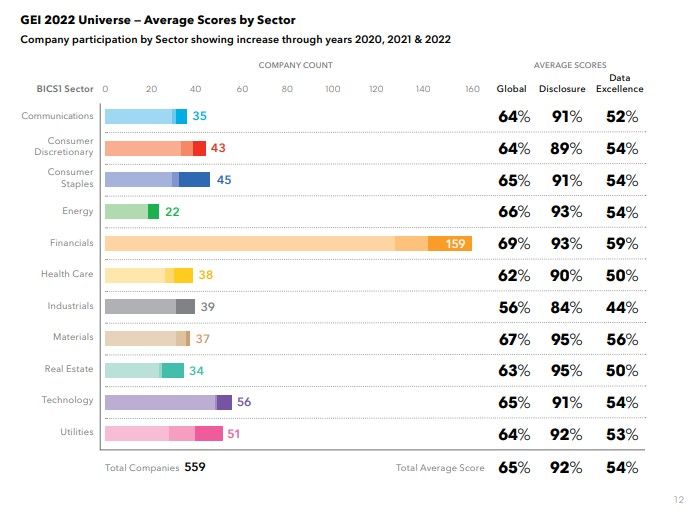Financial services is the highest scoring sector in the latest Gender-Equality Index (GEI) from Bloomberg, as overall a record number of firms disclosed diversity data.
The GEI framework scores companies across five key pillars:
- Women’s leadership and talent pipeline
- Equal pay and gender pay parity
- Inclusive culture
- Anti-sexual harassment policies
- Pro-women brand
The report that accompanied the release of the 418 names featured in the 2022 index, Invest in a more equal future – GEI Insights, showed financials had the highest average global score of 73%, and the highest average data excellence at 63%. These have increased by 7% and 10% respectively from the previous year.
Financials also had the highest pro-women brand scores with one of the highest percentages of women making up the total taskforce at 52% – compared with 53% in healthcare (highest) and 22% in materials (lowest). However, the sector fell down when looking at the percentage of women executives with only 23% (of those that disclosed this data) saying half or more of their senior management teams were made up of women.
When looking at inclusive culture, financials also performed well again with a score of 74% compared to the average of 68%.

Overall, Bloomberg said it in a statement it was encouraged by the number of companies being transparent with their gender-related practices – this year the number of companies disclosing data increased by 20%. This demonstrates a “growing commitment to gender equality and recognition that the global business community can lead the charge for meaningful change by committing to more transparent reporting and disclosure of social data”.
“The changing nature of work due to the pandemic has highlighted the importance of addressing gender equality issues in a rapidly-evolving global workforce,” added Peter Grauer, chairman of Bloomberg.
“The Bloomberg Gender-Equality Index recognises companies that are maintaining a strong focus on providing an inclusive work environment that supports the evolving needs of employees and retains the competitive strengths gained through gender diversity, which is increasingly critical in this challenging business environment.”
Some of the financial services names included in the GEI are: abrdn, Allianz, Banco Santander, Barclays, BlackRock, BNP Paribas, Credit Suisse, Dow, ING, Janus Henderson, JPMorgan Chase, Legal & General, Lloyds, M&G, Manulife, Moody’s, Morgan Stanley, Morningstar, Nasdaq, Nomura, Purdential, S&P Global, Standard Bank, State Street, Sumitomo Mitsui Trust Holdings, T. Rowe Price, Goldman Sachs, UBS, Willis Towers Watson and Zurich. The full list of 418 names can be viewed here.
Key findings
Broader key findings included on average GEI members’ boards are comprised of 31% women and 72% the member companies have a chief diversity officer or an executive with the primary responsibility of diversity and inclusion.
There are also improvements in recruiting women, with 83% of firms having a direct strategy for this, and 66% of members conducting global gender-based compensation reviews. Bloomberg said these companies are also more likely to adopt family-friendly policies: for example, 75% of member companies offer on-site lactation rooms for new mothers and 59% of them provide childcare subsidies or other financial support.
Furthermore, more than half (63%) of member companies sponsor financial education programmes for women, and 65% sponsor programmes dedicated to educating women in STEM.
Julie Sweet, chair and CEO of Accenture, which was included in the GEI, said: “Programmes, policies and practices are now table stakes, but lasting change comes from creating a culture of equality where everyone feels they belong – the accelerator of creating 360˚ Value for all stakeholders. The GEI is a valuable tool that puts a spotlight on progress and opportunities to improve.”








